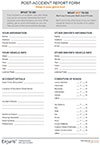What to do when a car leaves the scene
Did you know that one-quarter of car accidents in Florida involve a hit and run accident? While many of them only result in property damage, some of them can have deadly consequences – like what happened to Aaron Cohen.
Aaron was a 31-year-old husband, father and avid cyclist who was hit and killed by a drunk driver who then drove away, though he was later apprehended by law enforcement. The driver was sentenced to two years in prison, which was less than he would have received had he been sentenced on a DUI manslaughter charge. This is why Florida changed its laws in 2014, aptly naming its hit-and-run law the Aaron Cohen Life Protection Act (Florida Statute Section 316.027). This created a mandatory minimum of four years in prison, along with other consequences that we will explore.
Tweet this
What responsibilities does a driver have?
If you're at the scene of a hit-and-run accident, stay there and call the police. Not only is it the law, but you could also save a life.
There are a few different scenarios that each requires different responses.
- Property damage: The driver is required to stop at the vehicle or as close as possible; notify the owner or operator of the vehicle; present identification if requested to the other driver; present license and registration to officers; and if property damage is unattended, the driver must either locate the property owner or attach a conspicuous note and notify the closest police department.
- Bodily injury or death: All of the same duties above are required, though the driver must also "render reasonable assistance" if it is apparent that medical treatment is required, and the driver should also make arrangements to transport that person for medical or surgical treatment.
Penalties for leaving the scene:
- Property damage:
- Second degree misdemeanor
- Up to 60 days in prison
- $500 fine
- Injuries:
- Second or third degree felony
- Revoked license for at least 3 years
- Up to 5 years in prison
- $5,000 fine
- Fatalities:
- First degree felony
- Revoked license for at least 3 years
- Mandatory minimum of 4 years in prison
- Up to 30 years in prison
- $10,000 fine
Why wouldn't a driver stop!?
There are a number of reasons why a driver wouldn't stop after hitting a pedestrian or another car. It doesn't pay to try to figure out what was going on in that person's mind (when can we ever figure out what someone else's motivations are?), so here are a few reasons it possibly could have been:
- The driver had a suspended license
- He had too many outstanding tickets
- He didn't have a valid driver's license at all
- He was intoxicated or driving under the influence of drugs
- He doesn't have car insurance
- There is an outstanding warrant for his arrest
- He might not have permission to drive the car he's using (or it's stolen)
- He could be driving a company car and doesn't want to get in trouble with his employer
Do not – repeat, do not – try to chase after the driver, even if you think you can gain on him. The only thing that will achieve is you getting pulled over for speeding.
So what should I do?
Well, the first thing to do? Remain calm. Breathe. Check on everyone else in the car. Stay at the scene and call the police; this way, you will be able to preserve the official record for the insurance company, and it is also state law that you remain at the accident scene. Provide basic first aid to anyone if necessary and wait for emergency medical services to get there. If you can, get your car to the side of the road and out of the flow of traffic.

Sample post-accident report form to keep in your glove box - fill out at the scene or as soon as you can after a car accident
Download in PDF format
While waiting for the cops to arrive, collect any information you can. A post-accident form kept in the glovebox of your car can be extremely helpful for times like this. While the information will be one-sided, you can at least write down what you remember about the other car. Take pictures on your phone of the accident scene, your car's damage, the weather, and anything else that could possibly be relevant. Too much information is better than too little. Also, don't forget to write down the contact information of any witnesses, because it can be very difficult to track them down again.
As for the hit-and-run driver, it's time to play the memory game. See what you can remember about their car.
- What color was it?
- Did it have any rust?
- Was it broken down? Brand new?
- Did it have any colorful bumper stickers? Political ones?
- Do you remember any of the license plate number?
- Are there any nearby stores with video cameras or red light cameras to check?
Finally, you will want to contact your insurance company and file a claim. Also check to see if you have uninsured motorist coverage to help offset any damage.
Read some of the resources below and speak with some of our listed Florida attorneys who are well versed in this area. They will be able to help you through this.
Helpful resources to help you hire the best Florida personal injury lawyer
- Choosing a personal injury attorney – interview questions
- When do you NOT need an attorney after an accident?
- Preparing to meet with a personal injury attorney
- How damages are calculated
- How to talk to a lawyer
- Negotiating lawyers' fees - how do accident lawyers charge? Are there any hidden costs?
See our guide Choosing a personal injury attorney.




